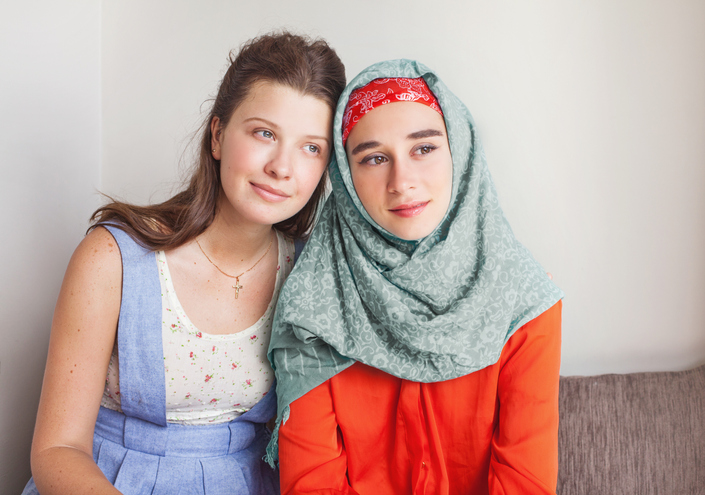Female genital mutilation (FGM)
Female genital mutilation (FGM) is when a girl’s genitals are partly or entirely removed, cut, sewn or damaged.
This content has been written for children and young people. If you’re looking for information for over 18s, visit our Types of Crime information about female genital mutilation.
FGM is also known as female circumcision, cutting or sunna.
This may have already happened to you, or you may be worried this is going to happen.
It is very important that you get support from a trusted adult outside of the situation to help you cope with this.

Someone you know may arrange for FGM to happen to you because they think this is best for you, or that it is part of your religion or tradition. However, FGM is illegal in the UK and it is also illegal for you to be taken abroad for FGM.
FGM can be carried out by someone with no medical training or equipment and can be very painful and dangerous. It can lead to health and sexual problems including heavy bleeding, infections and problems later on in life when giving birth.
As this often happens to children under 18, this is seen as child abuse. There is no medical reason why FGM should be carried out.
Being affected by FGM, or being in danger of FGM happening to you, can make you feel worried, sad, scared or angry, especially if you feel like you’re trying to deal with this all on your own. Lots of young people find that it can help if they talk to someone.
Some things you can do are:
- If you are in immediate danger of FGM or being taken abroad for FGM you can call the police on 999, or you can think about reporting it to the police.
- Tell an adult you trust – this could be a teacher, your youth worker, social worker or support worker. Think about talking to someone outside of your family situation who can give you independent advice. It can be difficult to know how to have this conversation, but we have some tips on asking for help.
- You could develop a safety plan with an adult you trust, which would help you choose how best to keep yourself safe.
- Talk to your friends. A good friend will listen to you and may help you speak to an adult.
If you are worried about a friend, we have some tips on how you can start the conversation and get them the right help.
If FGM has happened to you recently and you feel unwell or worried that you may develop health problems, it’s important you get help from a doctor or nurse as soon as you can. You may need to call an ambulance on 999 or go to the A&E (accident and emergency) department at your local hospital if you need urgent help. The NHS provides some specialist services for women and girls who have experienced FGM and more information can be found on the NHS website.
Experiencing FGM can also affect you psychologically – you may be upset and distressed about what has happened. It can help if you talk to someone you trust or an organisation that can help from the list below.
Many people think FGM is something that happens in Africa, the Middle East and Asia, but it is also happening in the UK. Although it can happen anywhere, in the UK it tends to happen in areas where there are first-generation immigrants, refugees and asylum seekers.
The school summer holidays in particular are when many young girls are taken abroad, often to their family’s birth country, to have FGM performed.
If you think there is any possibility that this might be being planned for you, talk to an adult who you trust or call the 24-hour free NSPCC FGM helpline on 0800 028 3550. You can also email fgmhelp@nspcc.org.uk. If you are in immediate danger you can call 999, or if you are at the airport you can alert airport security staff.
The FGM statement on the government website highlights the fact that FGM is a serious criminal offence in the UK, with a maximum penalty of 14 years in prison.
Victim Support’s Children and Young People Services – you can contact your nearest Victim Support office, call the 24/7 Supportline, contact us via live chat, or if you are 16 or older, you can create a My Support Space account. This is a free, safe and secure online space where you can work through interactive guides to help you move forward after crime.
NSPCC FGM helpline – a 24-hour free helpline for anyone worried about FGM: 0800 028 3550.
Forward – support, advice and information about accessing specialist health care and counselling for girls and women affected by FGM.
Southhall Black Sisters – highlights and challenges violence against black (Asian and African-Caribbean) women. They offer a range of services.
Orchid Project – an organisation is working towards ending FGM.
Daughters of Eve – works to protect girls and young women at risk from FGM.
The Metropolitan Police Service – the force has a dedicated service for girls at risk of FGM. Call their Child Abuse Investigation Command/Project Azure: 020 71612888.
Crimestoppers – if you want to provide information about a crime without talking to the police, you can contact Crimestoppers anonymously: 0800 555 111.
Childline – 24-hour support for young people, both on the phone and through online chats and message boards, on physical, sexual and emotional abuse and a range of other issues: 0800 1111.
The Mix – information and support for under 25s on a whole range of issues, including rape and sexual assault as well as safe sexual relationships. Get confidential help by email, text, webchat or phone: 0808 808 4994.
